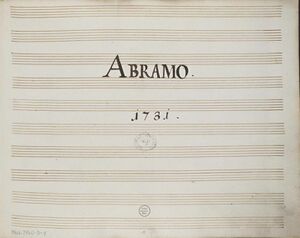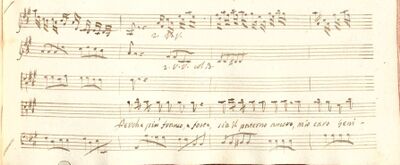Difference between revisions of "Perché più franco"
| (11 intermediate revisions by the same user not shown) | |||
| Line 80: | Line 80: | ||
<!-- Place <div class="wrapperlibretti"> on top of the libretto and close it in the end.--> | <!-- Place <div class="wrapperlibretti"> on top of the libretto and close it in the end.--> | ||
<!-- Use Template:Libretti, not custom HTML on the page.--> | <!-- Use Template:Libretti, not custom HTML on the page.--> | ||
<div class=" | <div class="eighteenth"> | ||
{{Song header <!-- use of this template automatically includes Template:Custom/songinfo.css --> | {{Song header <!-- use of this template automatically includes Template:Custom/songinfo.css --> | ||
| title = Perché più franco | | title = Perché più franco | ||
| english-title = | | english-title = That your fatherly love | ||
| composer = | | composer = [[Pietro Torri]] | ||
| lyricist = | | lyricist = [[Domenico Lalli]] | ||
| work = | | work = [[Abramo]] | ||
| catalogue = | | catalogue = | ||
| role = | | role = Isacco | ||
}} | }} | ||
</div> | </div> | ||
| Line 103: | Line 103: | ||
mi conferma tuo figlio il mio valore. | mi conferma tuo figlio il mio valore. | ||
fui da te generato per esser glorioso | fui da te generato per esser glorioso | ||
ed in terra, ed in | ed in terra, ed in cielo. | ||
ecco la via che tal mi rende. | ecco la via che tal mi rende. | ||
su prepara ormai il bel colpo felice, | su prepara ormai il bel colpo felice, | ||
se tra noi di lagnarsi or più non lice. | se tra noi di lagnarsi or più non lice. | ||
| Line 133: | Line 134: | ||
ed' in terra, ed' in Cielo. | ed' in terra, ed' in Cielo. | ||
ecco la via che tal mi rende. | ecco la via che tal mi rende. | ||
su prepara ormai il bel colpo felice, | su prepara ormai il bel colpo felice, | ||
se tra noi di lagnarsi or più non lice. | se tra noi di lagnarsi or più non lice. | ||
solo la cara madre raccomando al tuo amore. | solo la cara madre raccomando | ||
al tuo amore. | |||
addio, mio Padre. | addio, mio Padre. | ||
| Line 142: | Line 145: | ||
sia il paterno amore, | sia il paterno amore, | ||
mio caro Genitore, | mio caro Genitore, | ||
più non pensare à me. | |||
Prima di darmi morte | Prima di darmi morte | ||
| Line 153: | Line 156: | ||
| country =United Kingdom | | country =United Kingdom | ||
| language-note = | | language-note = | ||
| libretto-text =}} | | libretto-text =<poem>'''Recitativo''' | ||
Father, enough! | |||
Even if your pain | |||
confirms you enough, my father, | |||
me, your son, confirms my valour. | |||
I was fathered by you for glory, | |||
on earth as it is in heaven. | |||
Here is the path that will provide it. | |||
Come now, prepare the beautiful and joyful blow, | |||
If among us now lamenting is no longer permitted. | |||
I commend only my dear mother | |||
to your love. | |||
Goodbye, father. | |||
'''Aria''' | |||
That your fatherly love | |||
may be more sincere and stronger, | |||
my dear father | |||
Do not think of me anymore. | |||
Before you kill me | |||
You can pretend to yourself | |||
That the one you want to kill | |||
Is not your son.<ref name="FR"/></poem> | |||
}} | |||
<!--{{Libretti | <!--{{Libretti | ||
| country = | | country = | ||
| Line 161: | Line 189: | ||
</div> | </div> | ||
{{Clear|left}} | {{Clear|left}} | ||
==Context and translator's notes== | |||
God demands that Abraham prove his loyalty by sacrificing his son, Isaac (Genesis 22:1-13). While in the original bible passage, Isaac is bound and silent while Abraham prepares the sacrifice, in Lalli's/Torri's version he is willing to give his life. Lalli makes it quite clear that for Isaac, sacrificing himself for God is a heroic deed. It might prove an interesting future task for scholars to find out what motivated Lalli to this change. It stands to reason that heroic sacrifice was to be glorified, and the sacrifice of an Isaac that finds heroism in his deed might have fit better into the politics of the day (maybe as preparation for a war) than, e. g., Jesus' entirely passive attitude. (FR, 2021) | |||
==Manuscripts and sheet music== | ==Manuscripts and sheet music== | ||
[[File:Incipit of Perche piu franco e forte.jpg|thumb|400px|alt=Incipit of Perche piu franco e forte|Incipit of ''Perche più franco e forte''<ref name="Bayerische"/>]]<!-- incipit --> | [[File:Incipit of Perche piu franco e forte.jpg|thumb|400px|alt=Incipit of Perche piu franco e forte|Incipit of ''Perche più franco e forte''<ref name="Bayerische"/>]]<!-- incipit --> | ||
Free Score at the IMSLP: | Free Score at the IMSLP: | ||
| Line 256: | Line 286: | ||
|archive-date={{date|2021-10-15|MDY}} | |archive-date={{date|2021-10-15|MDY}} | ||
|quote=}}</ref> | |quote=}}</ref> | ||
<ref name="FR">English translation by Birikein & FR, 2021</ref> | |||
}} | }} | ||
[[Category:18th-century music]] | [[Category:18th-century music]] | ||
[[Category:sacred]]<!-- secular or sacred --> | [[Category:sacred]]<!-- secular or sacred --> | ||
Latest revision as of 00:43, 17 October 2021
| by PIetro Torri | |
 Cover Abramo, manuscript, 1731[1] | |
| English | Abraham |
|---|---|
| Genre | Azione sacra (oratorio) |
| Libretto | Domenico Lalli |
| Language | Italian |
| Premiere | |
| Date | Spring 1731 |
| Location | Munich |
"Perché più franco" is an aria by Pietro Torri from his oratorio Abramo. The libretto was written by Domenico Lalli. THe preceding recitativo begins "Padre basta sin quì ..." and is included here for completion. [2]
It appears on the following album:
| Year | Album | Ensemble | Conductor |
|---|---|---|---|
| 2020 | La Vanità del Mondo (Album) | Ensemble Artaserse |
Libretto
from Abramo
Pietro Torri (music), Domenico Lalli (words)
Modernized Italian | |
Recitativo Punctuation and capitalization added. | |
Ancient Italian | |
Recitativo Text from the Autograph at the Bayerische | |
Recitativo | |
Context and translator's notes
God demands that Abraham prove his loyalty by sacrificing his son, Isaac (Genesis 22:1-13). While in the original bible passage, Isaac is bound and silent while Abraham prepares the sacrifice, in Lalli's/Torri's version he is willing to give his life. Lalli makes it quite clear that for Isaac, sacrificing himself for God is a heroic deed. It might prove an interesting future task for scholars to find out what motivated Lalli to this change. It stands to reason that heroic sacrifice was to be glorified, and the sacrifice of an Isaac that finds heroism in his deed might have fit better into the politics of the day (maybe as preparation for a war) than, e. g., Jesus' entirely passive attitude. (FR, 2021)
Manuscripts and sheet music

Free Score at the IMSLP:
- Manuscript:
- Copyist S-Dl-554
- Manuscript, 1731.
- Public Domain
- Sächsische Landesbibliothek, Dresden (D-Dl): Mus.2140-D-1
- "Abramo (Torri, Pietro), Manuscript, 1731". IMSLP. Sächsische Landesbibliothek, Dresden (D-Dl): Mus.2140-D-1. Archived from the original on October 1, 2021. Retrieved October 1, 2021.[1]
- Autograph, Bayrische Staatsbibliothek
- Abramo, V (4), Coro, strings - BSB Mus.ms. 234
- Torri, Pietro (1650-1737)
- Lalli, Domenico (1679-1741)
- Erschienen: 1731 (1731)
- Sprache: Italienisch
- Umfang: score: 74f
- Autograph, 2 Teile
- Ouverture zu Beginn (f.1-2) von anderer Hand; nur vl und b
- Lederband mit Goldornamenten
- Die Erstaufführung in München fand im Frühjahr 1731 statt
- Textbuch siehe D-Mbs 4|o P.o.ital. 198 und 4|o Bav. 2195/II,30
- Link zum Katalogisat/OPAC:
- http://opacplus.bsb-muenchen.de/title/BV039609200
- URN:nbn:de:bvb:12-bsb00065394-9
- Identifier: RISM 456010813 ; BSB-Hss Mus.ms. 234
- Standort: München, Bayerische Staatsbibliothek -- Mus.ms. 234
- "Abramo, V (4), Coro, strings - BSB Mus.ms. 234 : [spine title:] ABRAMO // ORATOR[IO], Autograph". Bayerische Staatsbibliothek. Archived from the original on October 15, 2021. Retrieved October 15, 2021.[3]
References
- ↑ 1.0 1.1 "Abramo (Torri, Pietro), Manuscript, 1731". IMSLP. Sächsische Landesbibliothek, Dresden (D-Dl): Mus.2140-D-1. Archived from the original on October 1, 2021. Retrieved October 1, 2021.
- ↑ "Domenico Lalli". Wikipedia. Archived from the original on 15 October 2021. Retrieved 15 October 2021.
- ↑ 3.0 3.1 3.2 "Abramo, V (4), Coro, strings - BSB Mus.ms. 234 : [spine title:] ABRAMO // ORATOR[IO], Autograph". Bayerische Staatsbibliothek. Archived from the original on October 15, 2021. Retrieved October 15, 2021.
- ↑ English translation by Birikein & FR, 2021